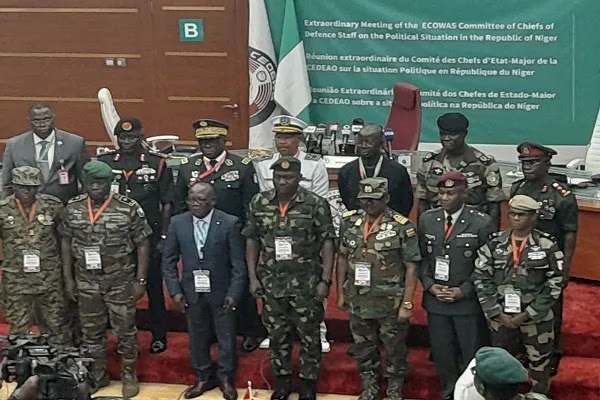The Chiefs of Defence Staff from Togo, Sierra Leone, Senegal, Nigeria, Ghana, Liberia, Guinea Bissau, Gambia, Cote’Divoire, Cabo Verde and Republic of Benin stated this at the end of their two-day high-powered delegation meeting.
The meeting, which started on Wednesday and chaired by the President of ECOWAS Military Chiefs at Defence Headquarters in Abuja, Gen. Christopher Musa, was shunned by the soldiers from Mali, Niger, Guinea and Burkina Faso.
Reading the communiqué from the meeting to journalists, Gen. Musa said they resolved to intensify diplomatic efforts to engage with all relevant stakeholders, and ensure dialogue and negotiation is at the forefront of the approach in resolving the crisis in Republic of Niger.
Musa said, “It has been an honour to preside over this extraordinary meeting on the situation of the recent coup in the Niger Republic as the President of this honourable committee of the CDS of ECOWAS States.
“I would like to extend my heartfelt gratitude to each one of you for your insightful contributions, thoughtful deliberations, and unwavering commitment to the cause of peace and stability in our region.
“Throughout our discussions, we have collectively recognised the gravity of the situation and the urgent need for a well-coordinated response. The deliberations have been marked by a spirit of unity, cooperation and determination to address the challenges at hand.
“We have examined the immediate implications of the coup on the Niger Republic and its potential ripple effects across the ECOWAS region. We have also deliberated on the broader implications for democracy, peace, and stability in West Africa.
“I am pleased to note that our discussions have yielded valuable insights and actionable recommendations. We have acknowledged the need for a comprehensive approach that encompasses political, security, and diplomatic dimensions.
“It is imperative that we translate our deliberations into concrete actions that can effectively address the crisis and prevent a recurrence in the future.
“Firstly, we must emphasize the importance of upholding democratic principles and the rule of law. The coup in the Niger Republic represents a blatant disregard for these fundamental principles that underpin our regional integration and stability. We must unequivocally condemn such actions and demonstrate our unwavering commitment to democracy.
“Secondly, we must strengthen our regional security architecture and enhance our collective response to security challenges. The coup in the Niger Republic has highlighted the fragility of our region and the need for a robust and proactive security framework.
“We must enhance intelligence sharing, joint training exercises, and capacity-building initiatives among our defense and security forces to effectively combat threats to our collective security and enhance interoperability.
“Thirdly, we must intensify our diplomatic efforts to engage with all relevant stakeholders. Dialogue and negotiation should be at the forefront of our approach in resolving the crisis in Republic of Niger.
“We must engage with the transitional authorities, civil society organizations, and other key actors to foster an inclusive and peaceful transition process.”
Also, speaking, the Commissioner for Political Affairs, Peace and Security, ECOWAS, Amb. Abdel-Fatau Musah, said the authority of the Heads of State of ECOWAS was committed to eradication of all forms unconstitutional takeover of power in the sub region.
He said there had been about eight to nine successful and unsuccessful coups in West Africa in the last three years, adding that all memberships of ECOWAS were led by democratically elected president before three years ago.
Musah said the threat of military takeover in West Africa had become pronounced in recent times, saying that efforts must be made to address the situation if the region must not become the laughing stock of Africa and the world.
He said the meeting of the defence chiefs was guided by the Protocol relating to the mechanism for conflict prevention, management, resolution, peacekeeping and security, which was adopted in 1999 and signed up to by all Member States in 2001.
“Respected chiefs of defense staff of our region, this is a clarion call to you. This is a test of the will of our militaries to demonstrate that we are having a democratically minded military whose responsibility is the protection of the state.
“So the diplomacy is being given a chance to succeed and like we said, the military option is the very last on the table. And if we can avoid that, a peaceful resolution is our preferred option but we have to prepare for all eventualities.
“The time has come again for ECOWAS to show that we are a rules-based organisation, we are rule based countries; we cannot allow the rule by the Ballot Box to be replaced by the rule of Kalashnikovs,” he said.



